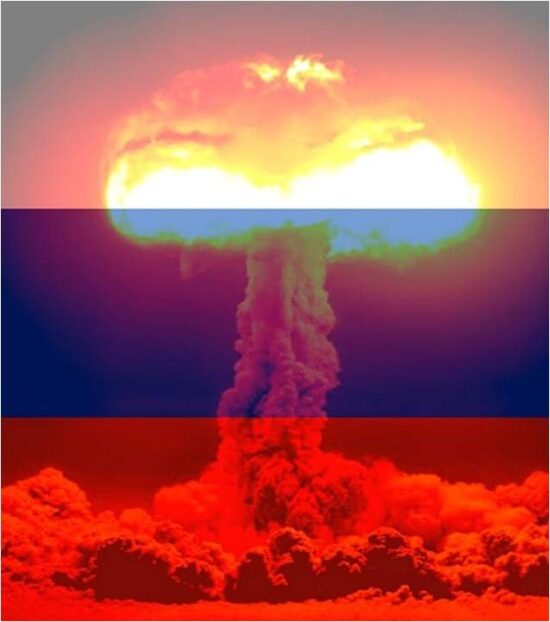When Russia invaded Ukraine, described by the former as a “special operation,” in other words, not really a war, the government in Moscow set off tipping points that are impacting food security, threatening a future nuclear war, and moving the global fight against COVID-19 and climate change from the forefront of our efforts to background noise.
COVID-19 Fight Victimized by War
As Ukrainians die from Russian missile strikes and the shelling of their cities, those who gather in bomb shelters are likely also having to deal with the spread of the latest COVID-19 Omicron variant which is running rampant around the planet. How do you combat a pandemic while your hospitals are targeted by a hostile military? It is practically impossible for Ukraine’s health system to deal equally with war injuries and the virus.
Food Insecurity Endangers Over 300 Million
Another consequence of Russia’s special operation is being felt in countries dependent on Ukraine for food. In a recent statement, the Executive Director of the United Nations’ World Food Program, David Beasley, noted that the war is putting 283 million on the planet at food risk and 45 million in immediate danger of famine. This is happening in countries that have depended on Ukraine for food staples including North and Sub-Saharan Africa, and countries in the Middle East.
For Europe A Choice: Fight Climate Change or Supply Energy
The fight to mitigate climate change is also a victim of this Russian aggression. Both Canada and the United States, as well as other fossil-fuel producing countries, are being encouraged to produce more coal, oil, and natural gas to offset the sanctioning of Russian energy resources. Meanwhile, Russia is still mining and pumping fossil fuels, finding alternate markets for its products. That means more greenhouse gas emissions (GHGs) are entering our atmosphere and contributing to global warming.
Threatening Nuclear War
And as if to make our lives in the 21st century even more precarious, Russian leaders keep the threat of nuclear war in the public conversation. Very early in the special operation, Russia’s President, Vladimir Putin, raised the spectre of a World War Three with atomic weapons being used not only on the battlefield but potentially as retaliation against nations helping Ukraine.
Yesterday, Russia’s Foreign Minister, Sergei Lavrov, repeated this warning noting that Western assistance to Ukraine was turning into a proxy war between his country and NATO, the North Atlantic Treaty Organization, the defensive pact including countries from North America and Europe. No longer a special action, Lavrov, referenced the Cuban Missile Crisis in 1962 as being a comparable moment in history, when the United States and the former Soviet Union took the world to the brink of a nuclear war. Lavrov condemned NATO countries for supplying Ukraine with defensive antitank weapons, drones, and armour to fight off the current Russian offensive in the south and east.
Three Tipping Points Tough to Reverse, One Irreversible
Ending Russia’s special operation now will not resolve three of four challenges. Russia’s aggression has set back our dealing with the latest COVID-19 variant. Besides Ukrainians killed by Russian bombs, shellfire, guns and missiles, there will now be victims of a broken healthcare system unable to treat those weakened by war and more susceptible to the virus.
Many experts believe that Russia’s aggression will speed up the conversion of the world’s economy from fossil fuels to low and zero-carbon energy alternatives. But realistically, before that and until well after the war ends we will see a rise in global GHG emissions from offsetting coal, oil and gas producers.
If Ukrainian farmers are unable to attend to fields, care for and harvest crops, and ensure that what is produced gets to market from a country severely disrupted by war, nations facing food insecurity and dependent on Ukraine for staples will see little relief for the foreseeable future without finding new sources of supply.
There is no immediate fix for Europe to replace Russian fossil fuel production. Finding alternative sources will require building a new import infrastructure. This could take several years requiring both ends of the supply chain to invest in the build. Europe likely will experience energy rationing next winter and may have to rethink its carbon-reduction plans. Germany in particular, the most Russian energy-dependent country on the continent, will need to consider energy alternatives which may require the reopening of coal mines, and continuing to use nuclear power plants that were to be decommissioned by years end.
But as for the nuclear threat Russia is brandishing over the rest of the world, this has to stop and it is the Russian people who need to act. How can Russians let their leaders take them on this thermonuclear destructive path? No one from Ukraine or from NATO is threatening nuclear war in response. The devastation of Hiroshima and Nagaski can never be forgotten. That’s what makes the Putin-Lavrov comments and threats so heinous.










[…] Vladimir Putin recently stated that America’s use of atomic bombs provided a “precedent” to justify his right to use them. Maybe he sees deploying nuclear weapons on the battlefield or bombing a Ukrainian city as a way to bring the latter to sue for peace, just as Japan did after two bombs were dropped. […]